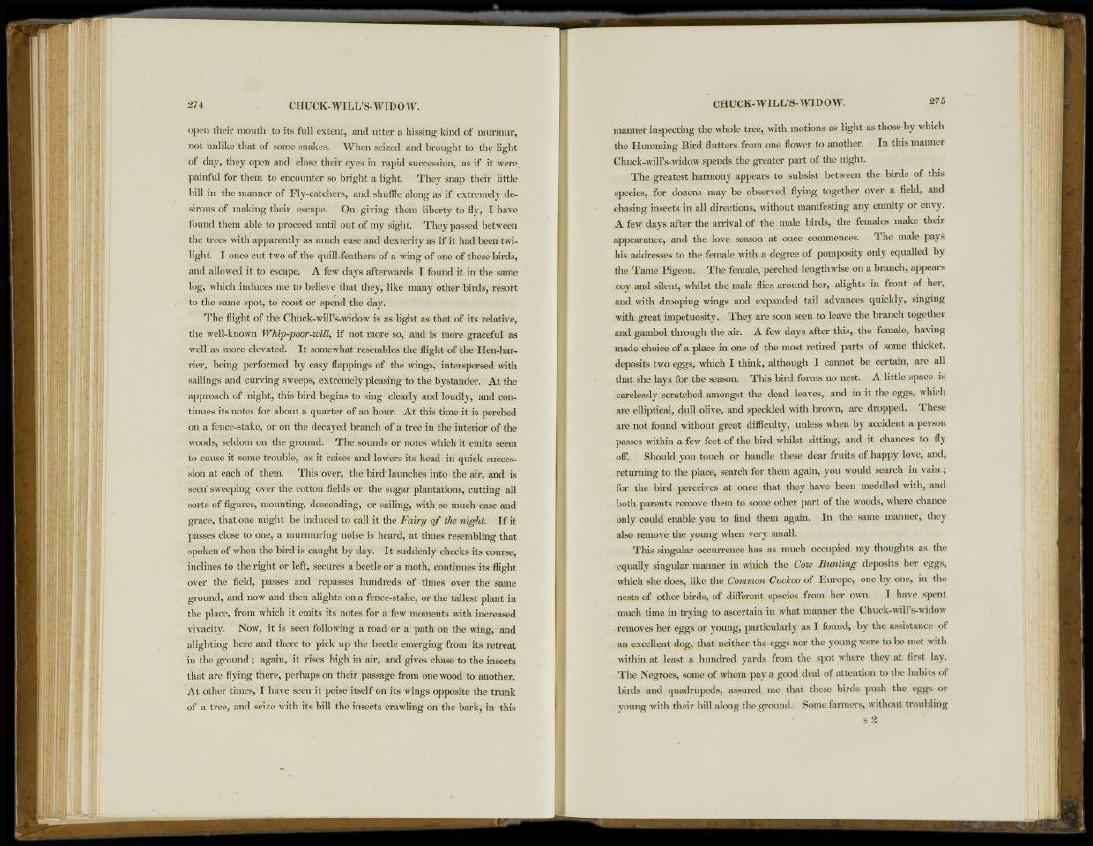
open their mouth to its full extent, and utter a hissing kind of murmur,
not unlike that of some snakes. When seized and brought to the light
of day, they open and close their eyes in rapid succession, as if it were
painfid for them to encounter so bright a light. They snap their little
bill in the manner of Fly-catchers, and shuffle along as if extremely desirous
of making their escape. On giving them liberty to fly, I have
found them able to proceed until out of my sight. They passed between
the trees with apparently as much ease and dexterity as if it had been twilight.
I once cut two of the quill-feathers of a wing of one of these birds,
and allowed it to escape. A few days afterwards I found it in the same
log, which induces me to believe that they, like many other birds, resort
to the same spot, to roost or spend the day.
The flight of the Chuck-wiLVs-widow is as light as that of its relative,
the well-known Whip-poor-will, if not more so, and is more graceful as
well as more elevated. It somewhat resembles the flight of the Hen-harrier,
being performed by easy flappings of the wings, interspersed with
sailings and curving sweeps, extremely pleasing to the bystander. At the
approach of night, this bird begins to sing clearly and loudly, and continues
its notes for about a quarter of an hour. At this time it is perched
on a fence-stake, or on the decayed branch of a tree in the interior of the
woods, seldom on the ground. The sounds or notes which it emits seem
to cause it some trouble, as it raises and lowers its head in quick succession
at each of them. This over, the bird launches into the air, and is
seen sweeping over the cotton fields or the sugar plantations, cutting all
sorts of figures, mounting, descending, or sailing, with so much ease and
grace, that one might be induced to call it the Fairy of the night. If it
passes close to one, a murmuring noise is heard, at times resembling that
spoken of when the bird is caught by day. It suddenly checks its course,
inclines to the right or left, secures a beetle or a moth, continues its flight
over the field, passes and repasses hundreds of times over the same
ground, and now and then alights on a fence-stake, or the tallest plant in
the place, from which it emits its notes for a few moments with increased
vivacity. Now, it is seen following a road or a path on the wing, and
alighting here and there to pick up the beetle emerging from its retreat
in the ground; again, it rises high in air, and gives chase to the insects
that arc flying there, perhaps on their passage from one wood to another.
At other times, I have seen it poise itself on its wings opposite the trunk
of a tree, and seize with its bill the insects crawling on the bark, in this
manner inspecting the whole tree, with motions as light as those by which
the Humming Bird flutters from one flower to another. In this manner
Chuck-willVwidow spends the greater part of the night.
The greatest harmony appears to subsist between the birds of this
species, for dozens may be observed flying together over a field, and
chasing insects in all directions, without manifesting any enmity or envy.
A few days after the arrival of the male birds, the females make their
appearance, and the love season at once commences. The male pays
his addresses to the female with a degree of pomposity only equalled by
the Tame Pigeon. The female, perched lengthwise on a branch, appears
coy and silent, whilst the male flies around her, alights in front of her,
and with drooping wings and expanded tail advances quickly, singing
with great impetuosity. They are soon seen to leave the branch together
and gambol through the air. A few days after tins, the female, having
made choice of a place in one of the most retired parts of some thicket,
deposits two eggs, which I think, although I cannot be certain, are all
that she lays for the season. This bird forms no nest. A little space is
carelessly scratched amongst the dead leaves, and in it the eggs, which
are elliptical, dull olive, and speckled with brown, are dropped. These
are not found without great difficulty, unless when by accident a person
passes within a few feet of the bird whilst sitting, and it chances to fly
off". Should you touch or handle these dear fruits of happy love, and,
returning to the place, search for them again, you would search in vain ;
for the bird perceives at once that they have been meddled with, and
both parents remove them to some other part of the woods, where chance
only could enable you to find them again. In the same manner, they
also remove the young when very small.
This singular occurrence has as much occupied my thoughts as the
equally singular manner in which the Cow Bunting deposits her eggs,
which she does, like the Common Cuckoo of Europe, one by one, in the
nests of other birds, of different species from her own. I have spent
much time in trying to ascertain in what manner the Chuck-willVwidow
removes her eggs or young, particularly as I found, by the assistance of
an excellent dog, that neither the eggs nor the young were to be met with
within at least a hundred yards from the spot where they at first lay.
The Negroes, some of whom pay a good deal of attention to the habits of
birds and quadrupeds, assured me that these birds push the eggs or
young with their bill along the ground. Some farmers, without troubling
s 2